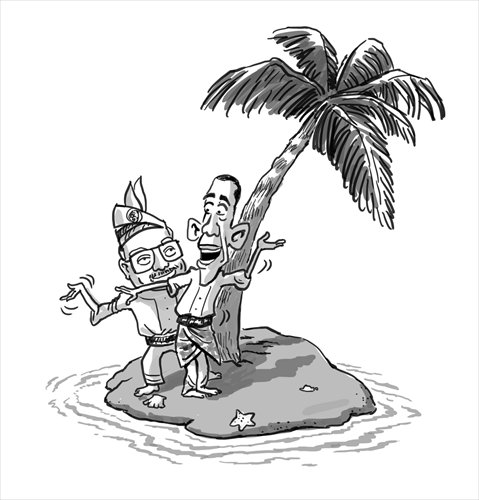HOME >> OP-ED
US counts on Malaysian role to aid pivot
Source:Global Times Published: 2014-4-24 22:58:06

Illustration: Liu Rui/GT
Malaysia will be the third stop of US President Barack Obama's Asia tour. This will be the first visit to Malaysia by a sitting US president in 48 years after then president Lyndon Johnson journeyed there in 1966.
Malaysia has long been marginalized among ASEAN member states in US diplomatic history. Given the drastic geopolitical changes in the Asia-Pacific region with a rising China, a strained scenario in Northeast Asia and scorching territorial disputes in the South China Sea, Washington has begun to adjust its Asia policy and adopt the "pivot to Asia" strategy.
Malaysia can play an irreplaceable role in helping Washington's "pivot to Asia" policy on both security and economic fronts, which prompted Obama to head to Kuala Lumpur Saturday in an aim to set a positive tone for US-Malaysia relations in decades ahead.
As an important country in the South China Sea, Malaysia was relatively mild in its territorial rows with Beijing in the past, compared with the Philippines and Vietnam. Therefore for a long time, it was a missing element in Washington's strategy to utilize South China Sea claimants to hedge China's growing military assertiveness.
Nevertheless, Kuala Lumpur took a subtle shift in its attitude last year following China's patrols around the Zengmu Reef in March 2013.
In response, Malaysia's defense minister announced that a new naval base would be built in the eastern city of Bintulu, some 60 nautical miles from the Zengmu Reef.
Kuala Lumpur has also quietly stepped up cooperation with Manila and Hanoi, the most outspoken and radical claimants, trying to tie Beijing to the South China Sea code of conduct (COC). The US intends to take advantage of the COC as an effective international norm to contain China.
In this way, Malaysia indirectly demonstrated its protest against China's military move as well as its attempt to grab the abundant natural resources in adjacent waters.
The Obama administration has sensed Malaysia's increasing apprehension regarding Beijing, and attempted to beef up its military presence and assistance there.
Another motivation for Obama to visit Kuala Lumpur lies in the country's protracted reluctance to sign the Trans-Pacific Partnership (TPP) agreement despite several rounds of negotiations.
The TPP is a high-standard and comprehensive free trade agreement, and Malaysia's state-owned enterprises, which constitute the bulk of all economic and industrial sectors, can hardly reach the stringent criteria of the partnership.
Dominated by the government, these enterprises provide a major source off government revenue. TPP entry will inevitably deal a severe blow to Malaysia's political bodies. That's why the Malaysian government has been taking a tough attitude toward signing the TPP.
Obama aims at pushing the negotiations forward when meeting with Malaysian Prime Minister Najib Razak, but is expected to meet certain obstacles.
For Malaysia, it indeed has several natural attributes to help the US better implement its "pivot to Asia" policy and safeguard its national interests.
Malaysia is located in a critical position in Southeast Asia. Positioned by the Strait of Malacca, Malaysia offers a wonderful strategic sea lane.
In parallel, as one of the five ASEAN founding members, Malaysia plays a unique and influential leadership role among all the 10 member states, with its promotion of peace and independence in regional affairs. Washington hopes to use its influence to unite ASEAN states to counterbalance Beijing's increasing power.
Notably, Malaysia is a member of the Organization of the Islamic Conference, a 56-member body promoting Muslim solidarity in economic, social, and political matters. As a moderate Muslim-majority country, Malaysia has been playing a vital role in the Muslim world.
For instance, it helped mediate the conflict between the Philippine government and the southern Muslim rebel group, and Prime Minister Najib Razak was present when the two sides signed the peace accord.
Malaysia's Muslims once contributed to the reconciliation between Israel and Palestinian Muslims. For a US also plagued by terrorist groups in the Middle East, Malaysia can offer endorsement and assistance in its anti-terror endeavors thanks to its Islamic and multicultural background.
Malaysia is the only country that is not a US ally among the four states listed on Obama's trip this time. It is expected that Obama will talk about issues covering both the bilateral relations and Malaysia's internal politics and democratic development.
Obama's forthcoming visit will present an opportunity to cement the recent positive development of US-Malaysia bilateral ties.
The article was compiled by Global Times reporter Wang Xiaonan, based on an interview with Zhang Mingliang, associate professor of the Institute of Southeast Asian Studies, Jinan University. wangxiaonan@globaltimes.com.cn
Posted in: Viewpoint